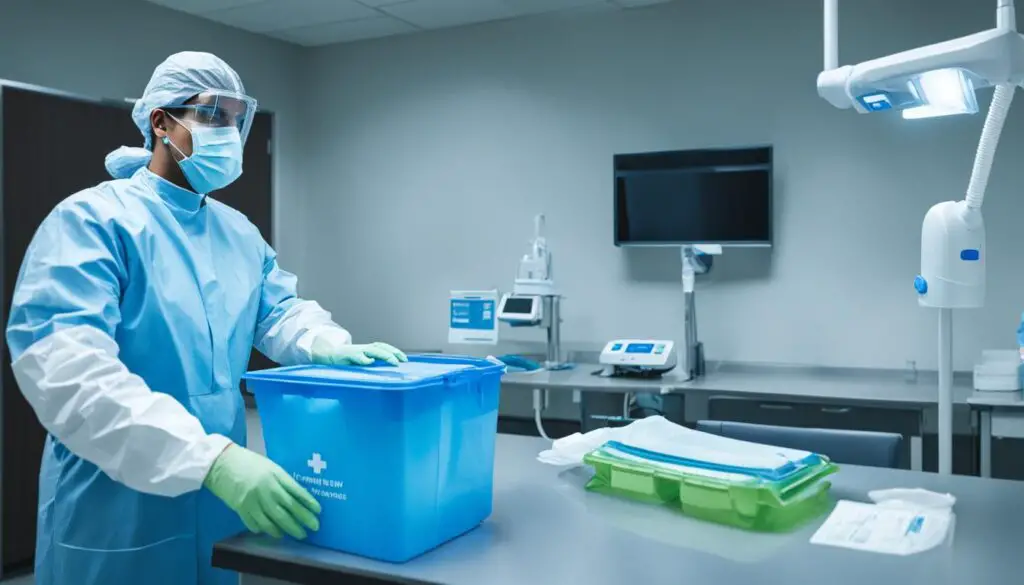
As the world grapples with an unprecedented health crisis, the role of healthcare professionals in protecting patient safety has become more critical than ever. Among the many healthcare professionals working tirelessly to keep patients safe are Infection Control Nurses. These specialized nurses take charge of implementing and enforcing infection control protocols to ensure healthcare safety and patient protection. In this article, we explore the responsibilities, opportunities, and demand for Infection Control Nurses, who play a crucial role in guarding public health.
What is an Infection Control Nurse?
An Infection Control Nurse is a specialized healthcare professional who plays a critical role in preventing and controlling infections in healthcare settings. They are responsible for implementing and enforcing strict infection control protocols, adhering to medical guidelines, and providing nursing care to prevent the spread of infections.
Infection Control Nurses work closely with other healthcare professionals to ensure patient safety and prevent outbreaks of infectious diseases. They are well-versed in the latest medical guidelines and use evidence-based practices to prevent the spread of infections.
Job Profile and Tasks of an Infection Control Nurse
An Infection Control Nurse is responsible for minimizing and managing the spread of infections in healthcare settings. This role involves various tasks and job profiles essential to ensuring public health and safety.
Conducting risk assessments: Infection Control Nurses perform infection risk assessments by analyzing data, tracking trends in disease occurrences, identifying vulnerabilities, and recommending preventive measures.
Developing infection prevention strategies: Infection Control Nurses develop and implement policies and procedures to prevent infections from spreading. This includes educating healthcare staff and patients on infection control practices, such as hand hygiene, personal protective equipment use, and disinfection protocols.
Monitoring compliance with infection control protocols: Infection Control Nurses assess adherence to infection control policies and procedures and monitor staff compliance. They implement appropriate corrective measures when necessary.
Investigating infectious outbreaks: Infection Control Nurses investigate epidemics or outbreaks of infections and make recommendations to contain and prevent the spread of diseases. They also coordinate with local health departments to ensure that the outbreak is under control.
These tasks are crucial to maintaining the safety and well-being of patients, visitors, and healthcare personnel. Infection Control Nurses play a critical role in preventing healthcare-associated infections and protecting public health.
Entry Opportunities and High Demand Countries
If you’re interested in pursuing a career as an Infection Control Nurse, there are several entry opportunities available. Most often, entry-level positions require at least an Associate’s degree in Nursing and relevant experience in the field. However, a Bachelor’s degree in Nursing or a related field can provide better employment prospects and career advancement opportunities.
Additionally, there are several countries with a high demand for Infection Control Nurses. These countries include the United States, Canada, the United Kingdom, Australia, and New Zealand.
| Country | Salary (Yearly) |
|---|---|
| United States | $73,000 – $118,000 |
| Canada | $56,000 – $92,000 |
| United Kingdom | £24,000 – £44,000 |
| Australia | AU$58,000 – AU$96,000 |
| New Zealand | NZ$60,000 – NZ$82,000 |
As shown in the table above, Infection Control Nurses can expect competitive salaries in these countries, with the United States offering some of the highest salaries.

The Situation of Infection Control Nursing in the U.S.
The demand for Infection Control Nurses in the United States has increased significantly in recent years due to the emergence of new viruses and the need for infection prevention and control in healthcare settings. Infection Control Nurses are responsible for developing and enforcing infection control policies in hospitals, long-term care facilities, and other healthcare institutions. They work closely with other healthcare professionals to protect patients, visitors, and staff from infectious diseases.
| Statistic | Number |
|---|---|
| Total number of Infection Control Nurse jobs in the U.S. | 25,000 |
| Top industries employing Infection Control Nurses |
|
| Required qualifications for Infection Control Nurse |
|
The U.S. healthcare system places a significant emphasis on infection prevention and control, and Infection Control Nurses play a crucial role in upholding this priority. Infection Control Nurses in the U.S. have the potential for career advancement, with opportunities to move into leadership roles and earn higher salaries with additional certifications and experience.
The Importance of Infection Control Nursing
The importance of infection prevention and control cannot be overstated, as the risks of infectious diseases can have severe consequences for patients, healthcare staff, and the broader community. Infection Control Nurses play a critical role in safeguarding public health, ensuring high-quality care, and reducing the spread of potentially dangerous illnesses. With the continued demand for healthcare services in the U.S., the role of Infection Control Nurses will only become more vital in maintaining healthcare safety and protecting patients, staff, and visitors alike.
The Situation of Infection Control Nursing in Europe
Europe showcases a diverse infection control nursing landscape, shaped by different healthcare systems, cultural norms, and epidemiological trends. In general, Infection Control Nurses in Europe hold similar responsibilities, focusing on preventing and controlling infections in various healthcare settings.
The training requirements for Infection Control Nurses vary between countries, with some offering dedicated infection control nursing programs or diplomas, while others require general nursing education and certification in infection control. The demand for Infection Control Nurses is high across Europe, with healthcare systems recognizing the pivotal role they play in patient safety.
| Country | Training Requirements | Job Prospects |
|---|---|---|
| Germany | Abschlussprufung fur Fachkraft fur Hygiene und Infektionspravention (Hygiene and Infection Control Professional Exam) | High demand in hospitals and public health agencies, with an average salary of €50,000 per year |
| France | Diploma in Infection Control Nursing | Strong demand in hospitals and long-term care facilities, with an average salary of €42,000 per year |
| Italy | Certification in Infection Control | High demand in hospitals and private clinics, with an average salary of €37,000 per year |
Overall, Infection Control Nursing in Europe presents a range of training, job prospects, and opportunities for growth and development. As healthcare systems continue to evolve and face new challenges, the role of Infection Control Nurses will remain essential in ensuring patient safety and public health.
The Situation of Infection Control Nursing in Other Regions
While the demand for Infection Control Nurses is high in the U.S. and Europe, it is also crucial to examine the situation in other regions worldwide, such as Asia, Africa, and Latin America. Infection Control Nurses in these regions face unique challenges and opportunities in maintaining healthcare safety and preventing infectious outbreaks.
In some countries, infection prevention and control practices may not be well established or prioritized. Cultural, economic, and logistical barriers may also hinder the implementation of effective infection control protocols. However, there is also an increasing awareness and need for infection control in these regions, leading to a growing demand for skilled Infection Control Nurses.

Training and Education for Infection Control Nurses
Becoming an Infection Control Nurse requires specific training and education to acquire the necessary skills and knowledge in infection prevention and control. Most employers require a Bachelor of Science in Nursing (BSN) degree. A Master of Science in Nursing (MSN) or a Master of Public Health (MPH) is preferred for higher-level positions.
Several organizations offer certifications specific to infection control nursing, including the Certification Board of Infection Control and Epidemiology (CBIC) and the Association for Professionals in Infection Control and Epidemiology (APIC). These certifications require passing an exam and ongoing professional development and renewal.
Continuing education and professional development are crucial for Infection Control Nurses to stay current with medical guidelines and emerging trends in infection prevention. Attendance at conferences, workshops, and seminars, as well as participation in self-directed study, are valuable ways to maintain competence and expertise in this field.
Education Requirements for Infection Control Nurses
| Degree Level | Requirements |
|---|---|
| Bachelor of Science in Nursing (BSN) | Minimum requirement for most employers |
| Master of Science in Nursing (MSN) | Preferred for higher-level positions |
| Master of Public Health (MPH) | Preferred for health promotion and community education positions |
Applying for Infection Control Nursing Positions
As an aspiring or experienced Infection Control Nurse, the application process for positions can be competitive. To ensure your success in the field, it’s important to put your best foot forward when applying for jobs. Here are some practical tips for crafting an effective resume and cover letter:
- Highlight your relevant education, experience, and certification credentials in your resume. Be sure to tailor your resume to the specific job requirements and showcase your skills in infection control, nursing care, and medical guidelines.
- Compose a compelling cover letter that demonstrates your passion for the field and explains how your skills can contribute to the employer’s infection control program. Emphasize your ability to work collaboratively with other healthcare professionals and your commitment to patient protection.
When called for an interview, prepare yourself by understanding the expectations of potential employers in this field:
- Research the organization and familiarize yourself with their infection control policies and protocols. Show your enthusiasm for their work and demonstrate how your skills can fit into their existing framework.
- Be prepared to answer questions about your experience and qualifications related to infection control nursing. Be specific in providing examples of how you have handled infection outbreaks in the past.
Remember, employers are looking for candidates who are committed to infection prevention and who can work effectively in a team environment. By following these suggestions, you can set yourself apart from other applicants and find success as an Infection Control Nurse.
Sectors and Industries Hiring Infection Control Nurses
If you’re interested in pursuing a career in infection control nursing, there are several sectors and industries that require the services of Infection Control Nurses.
One of the most common sectors hiring Infection Control Nurses is the healthcare industry, including hospitals, clinics, and long-term care facilities. These organizations require professionals who can develop and implement infection control protocols, educate staff on best practices, and monitor compliance with guidelines and regulations.
Public health agencies also hire Infection Control Nurses to control and contain the spread of infectious diseases. These nurses work closely with public health officials to identify and investigate outbreaks, develop prevention strategies, and communicate with the public about potential risks.
The pharmaceutical industry also employs Infection Control Nurses in a range of roles, including drug development and regulatory compliance. These professionals work to ensure that drugs and medical devices are safe for use and meet strict infection control standards.

Infection Control Nurse Employment Statistics by Industry
| Industry | Employment | Percent of industry employment | Hourly mean wage | Annual mean wage |
|---|---|---|---|---|
| General Medical and Surgical Hospitals | 70,140 | 1.31% | $42.11 | $87,620 |
| Offices of Physicians | 7,980 | 0.32% | $39.67 | $82,540 |
| Nursing Care Facilities (Skilled Nursing Facilities) | 7,760 | 0.47% | $31.78 | $66,110 |
| Home Health Care Services | 4,260 | 0.28% | $35.76 | $74,440 |
| Government | 3,710 | 0.17% | $41.78 | $86,930 |
Data from the Bureau of Labor Statistics (BLS) shows that the highest employment of Infection Control Nurses is in general medical and surgical hospitals, with 1.31% of the industry’s employment. Offices of physicians and nursing care facilities come next with 0.32% and 0.47% of industry employment, respectively. Higher wages can be found in government and general medical and surgical hospitals, where the hourly mean wage is $41.78 and $42.11, respectively.
Salary, Development Opportunities, and Promotion Prospects
Being an Infection Control Nurse can lead to attractive financial benefits over time. According to Bureau of Labor Statistics, the average annual salary of a registered nurse, which includes Infection Control Nurses, was $80,010 as of May 2020. This amount can vary according to factors such as experience, education level, and employer type.
As a specialized nursing field, there are several development opportunities for Infection Control Nurses to advance their skills and knowledge. Professional organizations such as the Association for Professionals in Infection Control and Epidemiology (APIC) offer advanced certifications such as the Certification in Infection Prevention and Control (CIC) credential, which can boost employment prospects and salary potential.
Furthermore, Infection Control Nurses can advance to leadership roles, including Infection Control Manager or Director positions, that oversee infection prevention and control programs in healthcare organizations. According to Glassdoor, the average salary for an Infection Control Manager in the United States is $103,195 per year.
Required Skills and Similar Professions
Becoming an Infection Control Nurse requires a specific set of skills and competencies that allow for success in this profession. Knowledge of infection prevention practices, attention to detail, strong communication, and leadership abilities are essential skills for this role.
Other professions related to Infection Control Nursing include Epidemiologists, Public Health Nurses, and Occupational Health Nurses. These roles all involve similar skills, such as data analysis, risk assessment, and knowledge of infectious diseases.
However, Infection Control Nursing is distinctive in its focus on preventing the spread of infections in healthcare settings, which requires a specific combination of clinical expertise and infection control knowledge.
As a result, Infection Control Nursing offers a unique career pathway for healthcare professionals looking to specialize in infection prevention and control, with broad opportunities for professional development and career growth.
Questions and Answers
What is the role of an Infection Control Nurse?
An Infection Control Nurse is a specialized healthcare professional responsible for preventing and controlling infections in healthcare settings. They implement and enforce strict infection control protocols, adhere to medical guidelines, and provide nursing care to prevent the spread of infections.
What are the specific job tasks of an Infection Control Nurse?
The tasks of an Infection Control Nurse include conducting risk assessments, developing infection prevention strategies, monitoring compliance with infection control protocols, educating healthcare staff, and investigating infectious outbreaks.
Where can I find opportunities to become an Infection Control Nurse?
There are opportunities to become an Infection Control Nurse in various healthcare settings, including hospitals, long-term care facilities, public health agencies, and pharmaceutical companies. Additionally, the demand for professionals in this field is particularly high in countries such as the United States and Europe.
What is the situation of Infection Control Nursing in the United States?
In the United States, there is a growing demand for Infection Control Nurses due to the increasing focus on patient safety and infection prevention. The role requires specific qualifications and certifications, and career pathways can lead to leadership positions within healthcare organizations.
What is the situation of Infection Control Nursing in Europe?
In Europe, the field of Infection Control Nursing varies across countries, but there is a general emphasis on infection prevention and control in healthcare settings. Training requirements and job prospects differ, with opportunities for professional development and specialization.
How does the situation of Infection Control Nursing differ in other regions?
In regions outside of the United States and Europe, such as Asia, Africa, and Latin America, Infection Control Nursing faces unique challenges and opportunities. The demand for professionals in these regions is influenced by healthcare infrastructure, resources, and infectious disease prevalence.
What qualifications are required to become an Infection Control Nurse?
To become an Infection Control Nurse, individuals typically need a registered nursing (RN) degree, along with additional training and certification in infection control practices. Continuing education and professional development are also important for staying updated on advancements in the field.
How can I apply for Infection Control Nursing positions?
When applying for Infection Control Nursing positions, it is important to craft a strong resume and cover letter highlighting relevant experience and qualifications. Prepare for interviews by familiarizing yourself with common infection control practices and demonstrating your understanding of the role.
Which sectors and industries hire Infection Control Nurses?
Infection Control Nurses are hired in various sectors and industries, including hospitals, long-term care facilities, public health agencies, and pharmaceutical companies. They are essential in maintaining healthcare safety and preventing the spread of infections.
What is the salary range for Infection Control Nurses?
The salary range for Infection Control Nurses can vary depending on factors such as experience, education, location, and the employing organization. However, professionals in this field generally earn competitive salaries, and there may be opportunities for advancement through certifications and leadership roles.
What skills are required to succeed as an Infection Control Nurse?
The skills required to succeed as an Infection Control Nurse include knowledge of infection prevention practices, attention to detail, strong communication and interpersonal skills, critical thinking abilities, and the ability to collaborate and work effectively with healthcare teams. Leadership skills are also important for career advancement in this field.
What are some similar jobs and professions in the field of healthcare infection control?
Some similar jobs and professions in the field of healthcare infection control include Epidemiologists, Infectious Disease Specialists, Hygiene Specialists, and Quality Assurance Managers. These professionals work closely with Infection Control Nurses to ensure healthcare safety and prevent the spread of infections.

